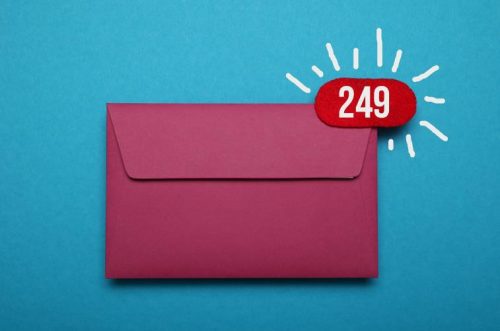Sending mass emails can be difficult sometimes. Whether using an auto-responder or manually sending the same email to everyone, the problem arises when those emails get to the junk mail folder. The problem could be with email warmup or spam email check. If this is happening to you, you might be interested in learning how to send mass emails without going to junk. So, here we will teach a proper way to send mass emails that will not be going to end in the junk folder.
So, first of all, you should know why your emails end up in the junk folder. This will be helpful for both large and small businesses.
 Following are some most common reasons:
Following are some most common reasons:
- No proper Email Warmup
- Getting Caught in Spam Email Check Filter
- Usage of Spam Trigger Words in Content
- Poor Content Formatting
- Bad Email Sending Frequency
- Sending Emails to the Wrong Audience
- Not Complying with CAN-SPAM Requirements
Besides these, there are several other reasons, but these are the most important ones. So, you will need professional assistance that will help you not end up in a Spam or Junk folder. Let’s start this guide and learn how you can send mass emails without going to junk and convey successful email warmup.
Why Are Your Emails Being Delivered to the Junk Folder by Spam Filter?
As mentioned above, there are several reasons behind your emails ending up in the Junk or Spam folder. So, let’s elaborate on these reasons and understand what to avoid when sending mass emails to prevent spam filters from delivering your emails to the junk folder.
No proper Email Warmup
If you are sending mass emails for the first time, chances are high that your emails will end up in the Junk folder because there is no proper email warming up. You should send a minimum number of emails per day in the beginning and gradually increase the numbers before sending bulk emails.
 If you are a beginner, then it is recommended for you to get a professional Email Warmup Service. It will also be very helpful for your emails to not end up in Junk.
If you are a beginner, then it is recommended for you to get a professional Email Warmup Service. It will also be very helpful for your emails to not end up in Junk.
Getting Caught in Spam Filter Due to Spam Trigger Words
Most email service providers use a spam filter to detect and block emails they think are spam. The most common type of filtering is based on keywords found in the body of the message or subject line. If your email contains these words or phrases, they will be considered Spam by Gmail, Outlook, Yahoo Mail, or other email service providers. Our tip is to use a spam email check every time you change something in your email.
Poor Content Formatting
 The format of your email can also have a big impact on whether it gets delivered or not. Email formatted poorly, using the wrong type of file attachment, or including broken links will often be caught by spam filters and automatically deleted before they even get to the inbox.
The format of your email can also have a big impact on whether it gets delivered or not. Email formatted poorly, using the wrong type of file attachment, or including broken links will often be caught by spam filters and automatically deleted before they even get to the inbox.
Bad Email Sending Frequency
The frequency of your email campaigns can also have an impact on whether they get delivered or not. Campaigns that send too many emails too frequently will often trigger spam filters, so it’s important to use an email inbox tester and space out your sends and limit them to one per day or week at most.
Sending Emails to the Wrong Audience
 Another common mistake is sending emails to the wrong audience. If you’re targeting a specific group of people with your campaign, it’s important to ensure they actually read and respond to that content. If they aren’t interested in what you’re offering, their spam filters might catch your email and delete it before anyone can see it, therefore you should test your email deliverability before making to much of a mistake.
Another common mistake is sending emails to the wrong audience. If you’re targeting a specific group of people with your campaign, it’s important to ensure they actually read and respond to that content. If they aren’t interested in what you’re offering, their spam filters might catch your email and delete it before anyone can see it, therefore you should test your email deliverability before making to much of a mistake.
Not Complying with CAN-SPAM Requirements
One of the biggest mistakes you can make is not complying with CAN-SPAM. The Can-Spam law was created to protect consumers from unwanted emails, so it’s important to follow its guidelines closely. If you don’t, then your email could be caught in a spam filter and deleted before anyone sees it.
How to Send Mass Emails Without Going to Junk?
By knowing the common mistakes and using a spam email check, you must have understood what to avoid in a mass email campaign. So, let’s discuss how to send mass emails without going to the Junk folder.
Meeting the Spam Filter Requirements
You must meet all the spam filter requirements to send email without going to the Junk folder.
 You can do this by following some simple steps:
You can do this by following some simple steps:
- Use a clean and appropriate list of email addresses
- Avoid excessive HTML formatting
- Keep the message short and concise
- Regularly test your email deliverability
- No false or misleading information
- Use a Subject Line that reflects the reason for the email
- Write your business detail like where you are from and located
- Include the Email Unsubscribe button
Preparing Your Sender Address
The second step to sending an email without going to the Junk folder is ensuring your sender address is clean, appropriate, and not associated with spam. You can achieve this by using a business-related email address or domain name verified by Google.
Regular Contact List Maintenance
 The third step to sending email without going to the Junk folder is using an email checker to keep your contact lists healthy. This means removing any old or invalid addresses from your list and ensuring you’re only sending emails to people who have not opted out for updates.
The third step to sending email without going to the Junk folder is using an email checker to keep your contact lists healthy. This means removing any old or invalid addresses from your list and ensuring you’re only sending emails to people who have not opted out for updates.
Creating Interesting and Non-Spammy Email Content
The fourth step to sending email without going to the Junk folder is to create interesting and non-spammy content. This means using a visually appealing layout, including an image or two in your email, and ensuring that any links you include are relevant and useful.
It’s also important to avoid using spammy words like “free,” “earn money,” “limited time only,” or anything else that could trigger spam filters.
Following the CAN-SPAM Act Requirements
Another important step to sending email without going to the Junk folder is strictly following the CAN-SPAM Act. This law includes rules and requirements for commercial email, including a requirement that you include a business address in every email you send. It also states that your emails must contain an opt-out option in case recipients don’t want future updates.
Use the Email Check Tool

Finally, you must ensure your email complies with the CAN-SPAM Act when using an Email Check Tool. It works like an email checker or email inbox tester that will help you test emails before sending them. A good email check tool will also help you perform an email deliverability test, which is essential to test email deliverability.
What is the Email Deliverability Test?
The email deliverability test is a service that allows you to test email deliverability. This test checks whether your emails are being delivered or ending up in the receiver’s Spam or Junk folder.
Wrapping Up
It’s important to remember that email marketing is a long-term strategy. Building up your list of subscribers takes time and patience, so you will have to work hard and build a successful email marketing list. Just focus on sending high-quality content regularly and following the CAN-SPAM Act guidelines.





































